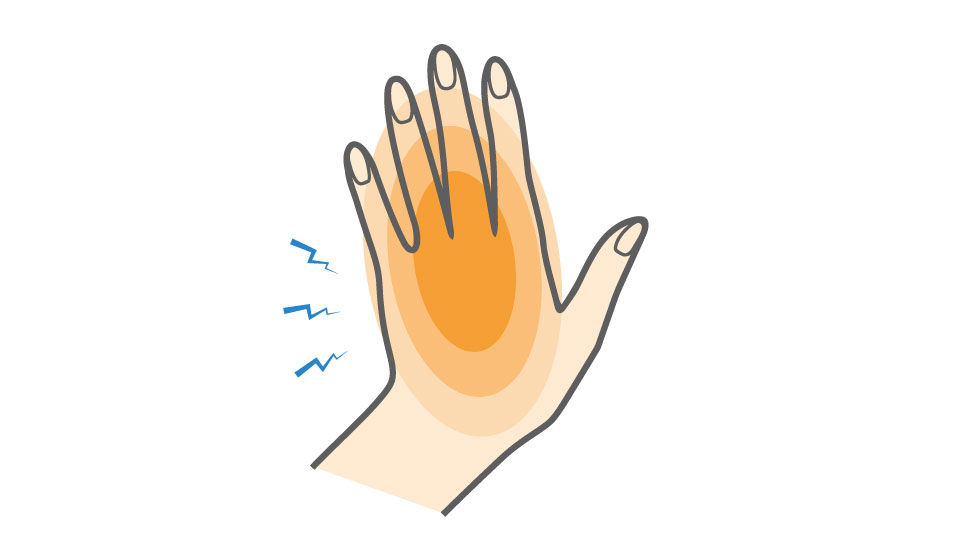Hand Contusion Causes, Symptoms & Treatment Options
Hand contusions are common injuries caused by direct impact, crushing, or blunt trauma. They typically cause localized pain, swelling, and bruising without fracture or joint damage. Management is usually non-surgical, emphasizing rest, ice, compression, and elevation, while monitoring for any nerve or circulation issues. Gradual, controlled movement early in recovery can help restore function and prevent stiffness.
Start with our quick Symptom Assessment or connect directly with an Upswing Coach today.
Request an AppointmentReady to take the next step?
Start your symptom assessment or connect with a coach instantly.
Find Relief TodayOverview
A hand contusion, or bruised hand, is a common minor sports injury caused by a direct impact. The trauma damages small blood vessels, allowing blood to leak into the surrounding tissues, which leads to localized swelling and discoloration.
While a hand contusion can cause pain and temporary difficulty with hand function, it is generally a self-limiting condition that resolves quickly with proper conservative care.

What causes Hand Contusion?
Hand contusions usually result from a direct impact or blunt-force trauma to the hand. Any force sufficient to injure the soft tissues can cause a contusion.
- How the Injury Occurs: Caused by a direct blow or blunt-force trauma to the hand, leading to bleeding and swelling within the soft tissues without breaking the skin.
- Common Everyday Causes: Can result from accidental impacts such as striking hard surfaces, closing a door on the hand, or falling onto an outstretched hand during daily activities.
These injuries are prevalent in sports. Activities frequently associated with hand trauma include:
- Football: Direct contact with opponents, tackles, or falls can apply significant force to the hand, causing bruising.
- Rugby: Repeated ball handling, scrums, and physical collisions increase the risk of hand contusions.
- Lacrosse: Stick checks, ball impact, and high-speed collisions frequently result in blunt trauma to the hand.
- Soccer: Less commonly, hand injuries may occur during falls, goalkeeping, or accidental contact with other players.
- Baseball: Catching fast-moving balls, batting impact, or fielding collisions can transmit force directly to the hand.
- Basketball: Ball impact, falls, and contact with other players often cause localized hand bruising.
Symptoms
A hand contusion typically presents with the following signs:
- Localized pain: Discomfort at the site of impact, often worsened by movement or pressure.
- Ecchymosis: Visible bruising or redness caused by bleeding under the skin.
- Swelling: Fluid buildup and inflammation around the injured tissues.
Most people retain normal hand movement despite the pain, though some activities may be limited. It is important to monitor symptoms, as hand contusions can sometimes mimic more serious injuries, such as fractures or ligament damage.
When to see a doctor
While most hand contusions are self-limiting and heal without medical intervention, certain signs indicate the need for professional evaluation to rule out more serious injuries, such as fractures or ligament damage.
Medical consultation is recommended if you experience any of the following:
- Progressive pain: Pain that worsens over time instead of improving.
- Extensive swelling and bruising: Large areas of discoloration or rapidly spreading bruising.
- Impaired hand function: Difficulty or inability to move the hand normally, grip objects, or perform routine activities.
Your physician will perform a thorough examination and may order imaging studies, such as X-rays or MRI, if needed to evaluate for fractures, ligament injuries, or other soft tissue damage caused by blunt trauma to the hand.
Non-operative treatment
Hand contusions are managed with conservative measures. Effective treatments, both at home and under clinical guidance, include:
- Elevation: Keep the hand above heart level to reduce swelling.
- Rest: Avoid activities such as play, heavy lifting, or repetitive hand use.
- Immobilization: Use a splint to limit motion and support healing.
- Ice therapy: Apply ice to the hand every 1–2 hours for 20 minutes during the first 48 hours. Avoid heat during this period, as it may increase swelling.
- Pain relief: Take over-the-counter medications such as ibuprofen or acetaminophen as needed.
Severe contusions may benefit from guidance by a physical therapist or athletic trainer, who can monitor recovery and help ensure a safe return to activity.
Follow these exercises to support your recovery:
Below is a PDF of the exercise program.
Recovery
Recovery from a hand contusion is generally rapid. Mild injuries often permit resumption of normal activities within several days, whereas more severe bruising may require several weeks for complete resolution.
Gentle stretching and mobilization may be initiated within a few days, progressing under a physician’s or physical therapist’s supervision.
Return to sports or other high-demand activities should occur only after the hand has regained full range of motion, strength, and functional capability.
Dr. Jay Kimmel is a board-certified orthopedic surgeon specializing in sports medicine, arthroscopic surgery, and shoulder and knee disorders. He completed his orthopedic training at New York-Presbyterian/Columbia University Medical Center and a Sports Medicine Fellowship at Temple University.
Dr. Kimmel previously served as the Director of the Connecticut Sports Medicine Institute at Saint Francis Hospital and has held faculty appointments as Clinical Assistant Professor in the Departments of Orthopedics and Family Medicine at the University of Connecticut. He has extensive experience caring for athletes as a team physician for high school and collegiate programs and continues to teach in the athletic training departments at Westfield State University and Springfield College.
Find the Support You Need — Right When You Need It
Whether you’re managing pain for the first time, need ongoing guidance, or require expert medical care, we’re here to help you every step of the way.
ORTHO DIRECT
Video visit with an orthopedic doctor for advice and a care plan.
$30
/MonthMRI DIRECT
Fast, affordable MRI with orthopedic review. No insurance required.
$499
/MonthFrequently Asked Questions
How long does it take to recover from a hand contusion?
Mild hand contusions typically heal within 3 to 7 days. More severe cases involving deep muscle bruising or extensive swelling may take 2 to 3 weeks. Adhering to RICE (Rest, Ice, Compression, Elevation) principles and avoiding reinjury are critical for healing.
What are the risks of not treating a hand contusion properly?
If left untreated, a hand contusion may lead to prolonged pain, restricted movement, or secondary complications such as muscle stiffness. Severe swollen hand conditions can also mask deeper injuries that require attention.
Can a blunt force injury to the hand lead to long-term issues?
In rare cases, yes. Repeated blunt force injuries to the hand or improper healing of severe contusions may result in chronic stiffness, reduced grip strength, or nerve sensitivity. Monitoring symptoms closely ensures proper recovery.
What is the difference between a hand contusion and a sprain?
A hand contusion involves damage to blood vessels and muscle tissue due to blunt trauma, while a sprain affects ligaments connecting bones.

